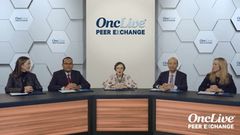
Predictive and Prognostic Biomarkers and Resistance Mutations
Episodes in this series

Transcript:
Joyce A. O’Shaughnessy, MD: Speaking of non-cross-resistance there, Aditya, you brought some very interesting data to ASCO [American Society of Clinical Oncology 2019 Annual Meeting] in terms of sequencing these. First, let’s hear from Debu. What about resistance mechanisms to the CDK4/6, in terms of what we should be thinking about next for these patients?
Debu Tripathy, MD: It’s been very difficult to sort this out at the beginning of all the trials, in terms of clinical factors. More recently now, with biomarkers available from clinical studies, we’re finding certain things. For example, cyclin E overexpression was shown by the group at the Royal Marsden [NHS Foundation Trust] to be predictive of the benefit. Apart from that, there are several prognostic factors. Aditya, you can amplify some of the Rb [retinoblastoma] findings, because I think there are some clues there.
Aditya Bardia, MD, MPH: Absolutely. I think it’s been an open question in terms of 3 things, 1 being, what are the biomarkers that predict for a patient who would derive benefit from a CDK4/6 inhibitor? Second, the what are prognostic factors? And third, what are the resistant factors, both in terms of patients who would have primary resistance, as well as secondary resistance. In terms of predictive biomarkers, the only predictive biomarker we have at this time is ER [estrogen receptor] for benefit with a CDK4/6 inhibitor. We had interesting data with cyclin E amplification that does appear to be somewhat predictive in terms of reduced benefit with a CDK4/6 inhibitor, but that’s based on only 1 trial. It would be interesting to see similar data from MONALEESA or MONARCH. If we consistently see that high cyclin E amplification is associated with no benefit with a CDK4/6 inhibitor, then that is something we could potentially utilize in clinical practice.
The third biomarker I would like to highlight is FGFR amplification—nice work from Carlos Arteaga, MD, and his group, which have shown that patients who have FGFR amplification derived reduced benefit with the addition of a CDK4/6 inhibitor. They still derive more benefit as compared with endocrine therapy alone. It’s more of a prognostic factor, as opposed to a predictive factor. In terms of resistance, we’ve seen the emergence of RB1 mutations in patients who get CDK4/6 inhibitors. The way CDK4/6 inhibitors work is that they block CDK4/6, and thus, essentially, the Rb is not able to block the cell cycle. If you lose Rb, then you’d lose dependence on CDK4/6 and cyclin D. Rb loss, including RB1 mutation, is 1 of the mechanisms of resistance to CDK4/6 inhibitors.
Thankfully it appears to be rare. About 5% of patients have acquired RB1 mutations. As we do additional biomarker work, we’ll be able to identify other mechanisms of resistance to CDK4/6 inhibitors, which I think would be important for sequencing. If you have a patient who progresses on first-line AI [aromatase inhibitors] plus a CDK4/6 inhibitor, what should we do next? I think, in part, it would depend on what we see as the mechanism of resistance.
Transcript Edited for Clarity





































